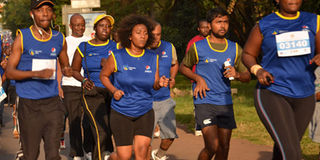Why neglecting physical exercises can be costly

There are various exercises that a person can engage in to keep fit and healthy. You can choose what suits you best, depending on what you want to achieve . Photo by Stephen wandera
What you need to know:
With the growing number of non-communicable diseases, mostly resulting from sedentary lifestyles, engaging in physical activities is important.
How to keep healthy through various physical exercises is the talk of most people. While many know the benefits of living an active lifestyle, not many actually practice it. Why do people find it hard to exercise and what is the cost of not doing so?
According to research conducted by sports firm Active Sports Consultancy around Kampala City on people’s fitness patterns, 68 per cent of the respondents said they found it hard to put in extra hours to work out. Such has come with associated conditions such as obesity, diabetes and heart diseases.
Age
Douglas Deogratias Bamweyana, a sports scientist at Makerere University’s Faculty of Science explains that age plays an important factor in how a person engages in physical activities.
“From the time you are born to about the age of 25, your muscles grow larger and stronger. But after 25 (peak maturity) you begin to lose muscle mass and function,” he says.
He says the rate of muscle loss also depends on one’s lifestyle – with physically inactive people losing between three to five per cent of muscle mass per decade.
This usually gets replaced with fat tissue. In this case, Bamweyana recommends engaging in active physical activity because when muscles are not worked up, they lose strength through a process called atrophy.
Fatigue
Fatigue is a state of being tired or exhausted. Although physical and mental fatigue is different, the two often happen at the same time. If a person is physically exhausted over long periods of time, they will also be mentally tired. When somebody experiences physical fatigue, it means they cannot continue functioning at their normal levels of physical ability. Mental fatigue, however, is associated more with feeling sleepy and being unable to concentrate properly. This can be overcome through exercise.
Weak bones
The weakening of bones in human beings can result in disability, thereby making it hard for a person to engage in any physical activities.
Stress
Stress is your body’s way of responding to any kind of demand. It can be caused by both good and bad experiences. When people feel stressed by something going in their lives, their bodies react by releasing chemicals into the blood. These chemicals give people more energy and strength, which can be good if their stress is caused by physical danger. But this can also be a bad thing if the stress is in response to something emotional and there is no outlet for the extra energy.
Work
Some people say they are unable to engage in physical exercises because of their daily work routine, which keeps them busy throughout the day with little time to do extra physical exercises. Some people think exercising is for athletes and in some cases when they fail to get good trainers, they give up keeping active.
Poor equipment
Poor sports equipment or lack of it to use for exercising has led some individuals to keep away from engaging in physical activities. Previous injuries that keep recurring may also make it hard for a person to return to an active physical life.
Size
Some people also think that because they are skinny, they do not require any exercise.
However, a person can exercise to gain, lose or maintain weight, and build cardiovascular and respiratory system and boost immunity. Therefore, regardless of weight, everyone needs some form of exercise
But not engaging in any physical activity can have negative health implications. It is the reason non communicable disease such as obesity, diabetes and cases of high blood pressure are on the increase in Uganda.
Dr Robert Basaza, a research scientist and physical fitness advocate at Makerere University College of Health Sciences describes obesity as excess fat in the body, in relation to lean tissue, which can potentially increase the risk of coronary artery diseases. Engaging in regular physical exercise can also help in weight management, building a strong respiratory system, reduced risk of coronary heart diseases, improved nervous system and self-confidence.
So how do you overcome this?
The body mass index (BMI) guides us on how we should maintain our health status. BMI is calculated from a person’s weight and height, and provides a reliable indicator for most people. In adults, when your BMI is less than 18.5, you are considered underweight.
Between 18.5 and 24.5 it is normal, while BMI of 24.5 to 29.5 is considered overweight. At BMI 30, a person is said to be obese. A BMI of 40 or above indicates that a person is morbidly obese. This can increase a person’s risk of death from any cause by 50 per cent to 150 per cent.




